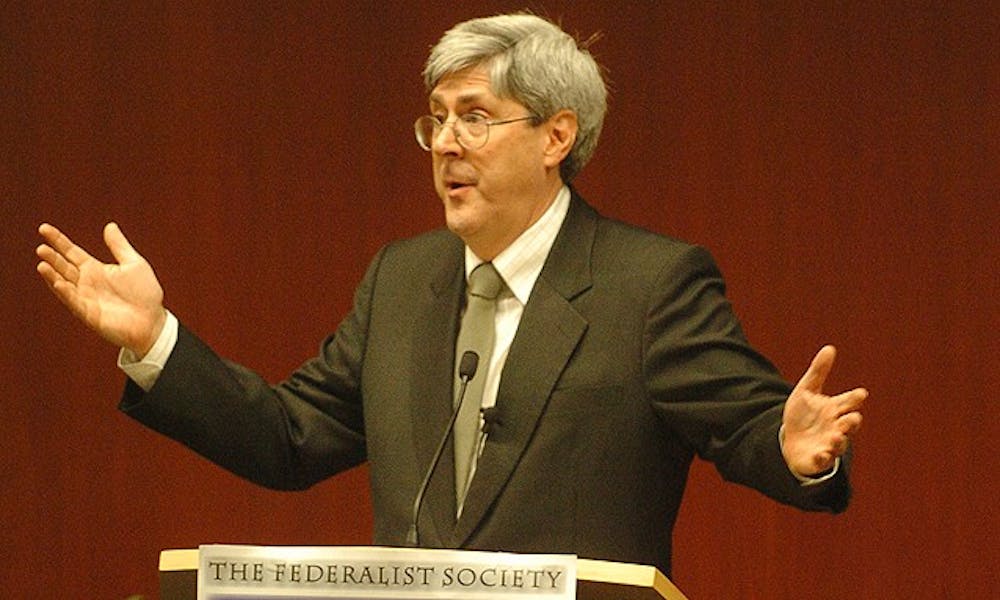Take some accounts of the inner workings of the Bush White House with a grain of salt.
That was Douglas Feith’s message to students in his speech at Duke Tuesday as he defended his record as an architect of the Iraq War. Feith, who served as under secretary of defense for policy under President George W. Bush from 2001 to 2005, spoke at the School of Law about his time in the White House. He was invited to the University by Duke’s chapter of The Federalist Society for Law and Public Policy Studies. The Duke University Program in American Grand Strategy and the American Constitution Society co-sponsored the event.
In his remarks titled “Setting the Record Straight: Legal and Strategic Thoughts on the War on Terrorism,” Feith explained the complex policy challenges involved in balancing public safety and civil liberties after the Sept. 11, 2001 terrorist attacks.
Feith said many of the restrictions limiting personal freedoms imposed by the Bush administration after 9/11—from increased airport security to waterboarding—were necessary to protect the nation’s fundamental liberty. These restrictions ensured that another attack—and subsequent increased trade-offs between freedom and security—would not happen, he said.
“Beyond the human and material costs it imposes, terrorism takes advantage of and thereby endangers the openness and trust that allow us to enjoy freedom and prosperity,” Feith said. “If another 9/11 happened—especially an attack involving chemical or biological or nuclear weapons—who could doubt that our society would respond by increasing further the powers of government affecting our freedoms?”
Feith, currently director of the Center for National Security Strategies and a senior fellow at the Hudson Institute, a conservative think-tank, is a controversial figure.
Along with five other Bush administration officials, Feith is under criminal investigation by a Spanish court for enabling torture by justifying the abuse of terrorism suspects. As under secretary of defense for policy, Feith helped devise the U.S. government’s strategy for the war on terrorism and advised Bush and Secretary of Defense Donald Rumsfeld on the wars in Afghanistan and Iraq.
Feith also ran the Office of Special Plans, a unit in the Pentagon harshly criticized by some for allegedly undercutting CIA intelligence on Iraq and developing alternative intelligence assessments. Some ex-government officials contend that Feith, as head of OSP, manipulated intelligence concerning the presence of weapons of mass destruction in Iraq and about the relationship between former Iraqi President Saddam Hussein and al Qaeda in order to justify the invasion.
In his lecture and in an interview, Feith denied these allegations.
“[The Office of Special Plans] was a consumer of intelligence, not a producer of intelligence,” Feith said in an interview. “There has been so much false stuff written about that that I’m happy to have yet another occasion to refute it.”
In his speech, Feith repeatedly said students should approach narratives of the Bush White House with skepticism and “get the facts as straight as [they] can.”
Still, some of the roughly 60 students who attended the lecture and subsequent question-and-answer session remained unconvinced that Feith was innocent of wrongdoing.
“It was ironic that at the end of his speech he said the theme of it was skepticism... when his office pushed faulty intelligence and went against the best judgement of the intelligence community and others at the expense of American interests and lives and treasure,” said Jason Rathod, a third-year law student.
Feith, who recently authored “War and Decision: Inside the Pentagon at the Dawn of the War on Terrorism,” is the second high profile conservative invited by The Federalist Society to speak on campus this month. Former U.S. ambassador to the United Nations John Bolton spoke on Obama’s foreign policy at the School of Law in early October.
James Pearce, a second-year law student and president of Duke’s chapter of the American Constitution Society, said bringing speakers such as Bolton and Feith to campus offer students a valuable opportunity to hear from those with dissenting opinions.
“I’m glad [Feith] came,” Pearce said. “I think he did a good job in opening himself up to—or at least suggesting he was open to—talk about all sorts of different things... but I also feel he did skirt some of the issues.”
Get The Chronicle straight to your inbox
Signup for our weekly newsletter. Cancel at any time.

